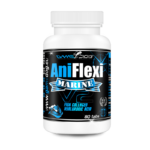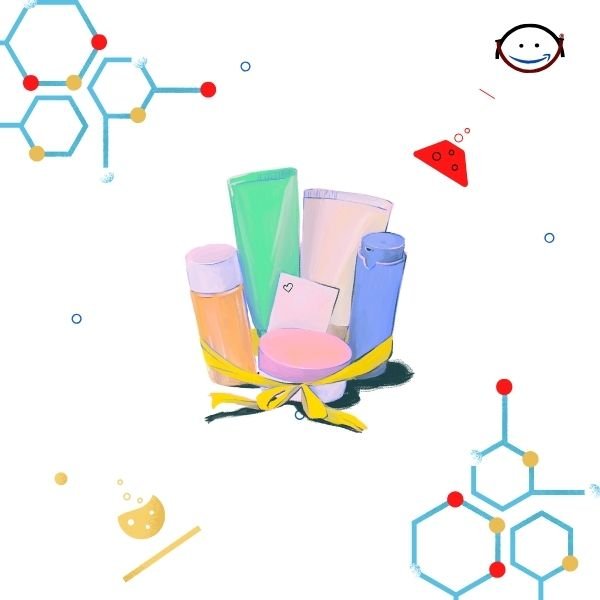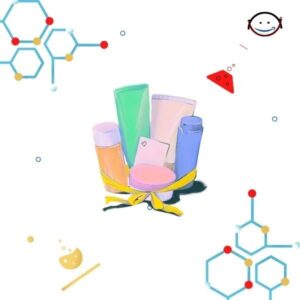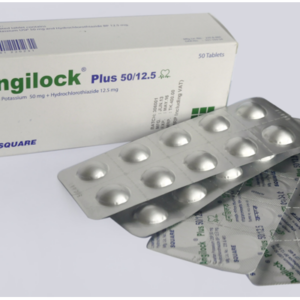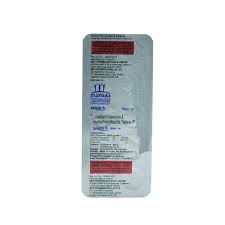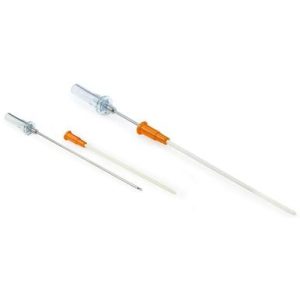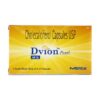-
DVION PEARL 60K CAP 4`s ₦2,768.75 QTY: 1
-
BENZER 2.5% 20GM GEL ₦1,679.50 QTY: 1
Customer matched zone "Lagos Delivery Options"
Sort by:
23569–23584 of 382360 Results
-
SaleSku: 1737074434-1093
ANGICAM LT 50/5MG TAB 15`S
₦1,500.00Original price was: ₦1,500.00.₦1,236.00Current price is: ₦1,236.00.₦1,500.00Original price was: ₦1,500.00.₦1,236.00Current price is: ₦1,236.00. Add to basket Quick View -
SaleSku: 1737074429-1092
ANGICAM M 50/5MG TAB 15`S
₦2,150.00Original price was: ₦2,150.00.₦1,771.50Current price is: ₦1,771.50.₦2,150.00Original price was: ₦2,150.00.₦1,771.50Current price is: ₦1,771.50. Add to basket Quick View -
-
-
SaleAngilock Plus 100 mg+12.5 mgThis is indicated for the treatment of hypertension. It is also indicated to reduce the risk of stroke in patients with hypertension and left ventricular hypertrophy.Theropeutic ClassCombined antihypertensive preparationsPharmacologyLosartan is an angiotensin II receptor antagonist. It selectively and competitively blocks the vasoconstricting and aldosterone-secreting effects of angiotensin II by selectively antagonising its binding to AT1 receptors.Hydrochlorothiazide inhibits the reabsorption of Na in the distal tubules causing increased excretion of Na and water including K and hydrogen ions.Dosage & Administration of Angilock Plus 100 mg+12.5 mgHypertension: Usual starting dose: 50/12.5 mg once daily. Titrate as needed to a maximum dose of 100/25 mg. Hypertensive Patients with Left Ventricular Hypertrophy: Not controlled on monotherapy: Initiate with 50/12.5 mg. Titrate as needed to a maximum of 100/25 mg. Dosing must be individualised. The usual starting dose of Losartan is 50 mg once daily, with 25 mg recommended for patients with intravascular volume depletion (e.g., patients treated with diuretics) and patients with a history of hepatic impairment. Losartan can be administered once or twice daily at total daily doses of 25 to 100 mg. If the antihypertensive effect measured trough using once a day dosing is inadequate, a twice a day regimen at the same total daily dose or an increase in dose may give a more satisfactory response. Hydrochlorothiazide is effective in doses of 12.5 to 50 mg once daily and can be given at doses of 12.5 to 25 mg. To minimise dose independent side effects, it is usually appropriate to begin combination therapy only after a patient has failed to achieve the desired effect with monotherapyDosage of Angilock Plus 100 mg+12.5 mgHypertension- The usual starting dose of 50/12.5 is one tablet once daily. For patients who do not respond adequately to one tablet the dosage may be increased to 100/25 once daily. A patient whose blood pressure is not adequately controlled with Losartan 100 mg monotherapy may be switched to this combination 100/12.5 once daily. In hypertensive patients with left ventricular hypertrophy initial dose is 50/12.5, if additional blood pressure reduction is needed, 100/12.5 may be given, followed by 100/25 if required. The maximum dose is 100/25 once daily. In general, the antihypertensive effect is attained within three weeks after initiation of therapy. No initial dosage adjustment of 50/12.5 is necessary for elderly patients. But maximum dose of 100/25 once daily dose should not be used as initial therapy in elderly patients. Severe Hypertension: The starting dose for initial treatment of severe hypertension is one tablet of 50/12.5 once daily. For patients who do not respond adequately to this dose after 2 to 4 weeks of therapy, the dosage may be increased to 100/25 once daily. The maximum dose is one tablet of 100/25 once daily. Administration of Angilock Plus 100 mg+12.5 mgThis preparation may be administered with other antihypertensive agents. This may be administered with or without food.Interaction of Angilock Plus 100 mg+12.5 mgLosartan Potassium: No significant drug-drug pharmacokinetic interactions have been found in interaction studies with Hydrochlorothiazide, Digoxin, Warfarin, Cimetidine and Phenobarbital. As with other drugs that block angiotensin II or its effects, concomitant use of potassium-sparing diuretics (e.g. Spironolactone, Triamterene, Amiloride), potassium supplements, or salt substitutes containing potassium may lead to increase in serum potassium. As with other antihypertensive agents, the antihypertensive effect of Losartan may be blunted by the non-steroidal anti-inflammatory drug Indomethacin.Hydrochlorothiazide: When administered concurrently, the following drugs may interact with Thiazide diuretics: alcohol, barbiturates, or narcotics-potentiation of orthostatic hypotension may occur. Antidiabetic drugs (oral agents and Insulin): dosage adjustment of the antidiabetic drug may be required.Other antihypertensive drugs: additive effect or potentiation.Cholestyramine and colestipol resins: absorption of Hydrochlorothiazide is impaired in the presence of anionic exchange resinsContraindicationsThe combination of Losartan and Hydrochlorothiazide is contraindicated in patients who are hypersensitive to any component of this product. Because of the Hydrochlorothiazide component, this product is contraindicated in patients with anuria or hypersensitivity to other sulfonamide-derived drugs.Side Effects of Angilock Plus 100 mg+12.5 mgSide-effects are usually mild. Symptomatic hypotension including dizziness may occur, particularly in patients with intravascular volume depletion (e.g. those taking high-dose diuretics). Hyperkalaemia occurs occasionally; angioedema has also been reported with some angiotensin-II receptor antagonists. Vertigo; less commonly gastro-intestinal disturbances, angina, palpitation, oedema, dyspnoea, headache, sleep disorders, malaise, urticaria, pruritus, rash; rarely hepatitis, atrial fibrillation, cerebrovascular accident, syncope, paraesthesia; also reported pancreatitis, anaphylaxis, cough, depression, erectile dysfunction, anaemia, thrombocytopenia, hyponatraemia, arthralgia, myalgia, renal impairment, rhabdomyolysis, tinnitus, photosensitivity, and vasculitis (including Henoch-Schonlein purpura)Pregnancy & LactationWhen pregnancy is detected, Losartan & Hydrochlorothiazide?should be discontinued as soon as possible. It is not known whether Losartan is excreted in human milk. Thiazides appear in human milk. Because of the potential for adverse effects on the nursing infant, a decision should be made whether to discontinue nursing or discontinue the drug, taking into account the importance of the drug to the mother.Precautions & Warnings Hypersensitivity: Angiooedema Periodic determination of serum electrolytes to detect possible electrolyte imbalance should be performed at appropriate intervals Hypokalemia may rarely develop, especially with brisk diuresis, when severe cirrhosis is present, or after prolonged therapy Impaired renal function and Symptomatic hypotension Overdose Effects of Angilock Plus 100 mg+12.5 mgLosartan Potassium: Limited data are available in regard to overdosage in humans. The most likely manifestation of overdosage would be hypotension and tachycardia; bradycardia could occur from parasympathetic (vagal) stimulation. If symptomatic hypotension should occur, supportive treatment should be instituted. Neither losartan nor its metabolite can be removed by hemodialysis.Hydrochlorothiazide: The most common signs and symptoms observed are those caused by electrolyte depletion (hypokalemia, hypochloremia, and dehydration resulting from excessive diuresis. If digitalis has also been administered, hypokalemia, may accentuate cardiac arrhythmias. The degree to which Hydrochlorothiazide is removed by hemodialysis has not been established.Storage ConditionsDo not store above 30?C. Keep out of the reach of children.Use In Special PopulationsUse in pediatric patients: The safety and effectiveness in paediatric patients have not been established.Use in patients with renal impairment: The usual regimens of therapy with Losartan & Hydrochlorothiazide may be followed as long as the patient?s creatinine clearance is >30 mL/min. In patients with more severe renal impairment, loop diuretics are preferred to thiazides, so Losartan & Hydrochlorothiazide is not recommended.Patients with hepatic impairment: Losartan & Hydrochlorothiazide is not recommended for titration in patients with hepatic impairment because the appropriate 25 mg starting dose of losartan cannot be given.Drug ClassesCombined antihypertensive preparationsMode Of ActionAngiotensin II formed from angiotensin I in a reaction catalyzed by angiotensin converting enzyme (ACE), is a potent vasoconstrictor, the primary vasoactive hormone of the renin-angiotensin system and an important component in the pathophysiology of hypertension. It also stimulates aldosterone secretion by the adrenal cortex. Losartan and its principal active metabolite block the vasoconstrictor and aldosterone-secreting effects of angiotensin II by selectively blocking the binding of angiotensin II to the AT1 receptor found in many tissues, (e.g. vascular smooth muscle, adrenal gland). In vitro binding studies indicate that losartan is a reversible, competitive inhibitor of the AT1 receptor. Neither Losartan nor its active metabolite inhibits ACE (kinase II, the enzyme that converts angiotensin I to angiotensin II and degrades bradykinin); nor do they bind to or block other hormone receptors or ion channels known to be important in cardiovascular regulation.Hydrochlorothiazide is a thiazide diuretic. Thiazides affect the renal tubular mechanisms of electrolyte reabsorption, directly increasing excretion of Sodium and Chloride in approximately equivalent amounts. Indirectly, the diuretic action of Hydrochlorothiazide reduces plasma volume, with consequent increases in plasma renin activity, increases in Aldosterone secretion, increases in urinary Potassium loss, and decreases in serum Potassium. The renin-aldosterone link is mediated by angiotensin II, so co-administration of an angiotensin II receptor antagonist tends to reverse the Potassium loss associated with these diuretics.PregnancyAngiotensin-II receptor antagonists should be avoided in pregnancy unless essential. They may adversely affect fetal and neonatal blood pressure control and renal function; skull defects and oligohy dramnios have also been reported. Information on the use of angiotensin-II receptor antagonists in breastfeeding is limited. They are not recommended in breastfeeding and alternative treatment options, with better-established?safety information during breastfeeding, are available.Pediatric UsesUse in Patients with Renal Impairment: The usual regimens of therapy with 50/12.5 may be followed as long as the patient's creatinine clearance is >30 ml/min. In patients with more severe renal impairment, loop diuretics are preferred to thiazides. In that case, hydrochlorothiazide is not recommended.Use in Patients with Hepatic Impairment: The combination of Losartan and Hydrochlorothiazide is not recommended for titration in patients with hepatic impairment because the appropriate 25 mg starting dose of Losartan cannot be given.Use in pediatric patients: The safety and effectiveness in pediatric patients have not been established.Sku: 1736103637-3323
Angilock Plus100 mg+12.5 mg
₦6,600.00Original price was: ₦6,600.00.₦5,940.00Current price is: ₦5,940.00.₦6,600.00Original price was: ₦6,600.00.₦5,940.00Current price is: ₦5,940.00. Add to basket Quick View -
SaleAngilock Plus 100 mg+25 mgThis is indicated for the treatment of hypertension. It is also indicated to reduce the risk of stroke in patients with hypertension and left ventricular hypertrophy.Theropeutic ClassCombined antihypertensive preparationsPharmacologyLosartan is an angiotensin II receptor antagonist. It selectively and competitively blocks the vasoconstricting and aldosterone-secreting effects of angiotensin II by selectively antagonising its binding to AT1 receptors.Hydrochlorothiazide inhibits the reabsorption of Na in the distal tubules causing increased excretion of Na and water including K and hydrogen ions.Dosage & Administration of Angilock Plus 100 mg+25 mgHypertension: Usual starting dose: 50/12.5 mg once daily. Titrate as needed to a maximum dose of 100/25 mg. Hypertensive Patients with Left Ventricular Hypertrophy: Not controlled on monotherapy: Initiate with 50/12.5 mg. Titrate as needed to a maximum of 100/25 mg. Dosing must be individualised. The usual starting dose of Losartan is 50 mg once daily, with 25 mg recommended for patients with intravascular volume depletion (e.g., patients treated with diuretics) and patients with a history of hepatic impairment. Losartan can be administered once or twice daily at total daily doses of 25 to 100 mg. If the antihypertensive effect measured trough using once a day dosing is inadequate, a twice a day regimen at the same total daily dose or an increase in dose may give a more satisfactory response. Hydrochlorothiazide is effective in doses of 12.5 to 50 mg once daily and can be given at doses of 12.5 to 25 mg. To minimise dose independent side effects, it is usually appropriate to begin combination therapy only after a patient has failed to achieve the desired effect with monotherapyDosage of Angilock Plus 100 mg+25 mgHypertension- The usual starting dose of 50/12.5 is one tablet once daily. For patients who do not respond adequately to one tablet the dosage may be increased to 100/25 once daily. A patient whose blood pressure is not adequately controlled with Losartan 100 mg monotherapy may be switched to this combination 100/12.5 once daily. In hypertensive patients with left ventricular hypertrophy initial dose is 50/12.5, if additional blood pressure reduction is needed, 100/12.5 may be given, followed by 100/25 if required. The maximum dose is 100/25 once daily. In general, the antihypertensive effect is attained within three weeks after initiation of therapy. No initial dosage adjustment of 50/12.5 is necessary for elderly patients. But maximum dose of 100/25 once daily dose should not be used as initial therapy in elderly patients. Severe Hypertension: The starting dose for initial treatment of severe hypertension is one tablet of 50/12.5 once daily. For patients who do not respond adequately to this dose after 2 to 4 weeks of therapy, the dosage may be increased to 100/25 once daily. The maximum dose is one tablet of 100/25 once daily. Administration of Angilock Plus 100 mg+25 mgThis preparation may be administered with other antihypertensive agents. This may be administered with or without food.Interaction of Angilock Plus 100 mg+25 mgLosartan Potassium: No significant drug-drug pharmacokinetic interactions have been found in interaction studies with Hydrochlorothiazide, Digoxin, Warfarin, Cimetidine and Phenobarbital. As with other drugs that block angiotensin II or its effects, concomitant use of potassium-sparing diuretics (e.g. Spironolactone, Triamterene, Amiloride), potassium supplements, or salt substitutes containing potassium may lead to increase in serum potassium. As with other antihypertensive agents, the antihypertensive effect of Losartan may be blunted by the non-steroidal anti-inflammatory drug Indomethacin.Hydrochlorothiazide: When administered concurrently, the following drugs may interact with Thiazide diuretics: alcohol, barbiturates, or narcotics-potentiation of orthostatic hypotension may occur. Antidiabetic drugs (oral agents and Insulin): dosage adjustment of the antidiabetic drug may be required.Other antihypertensive drugs: additive effect or potentiation.Cholestyramine and colestipol resins: absorption of Hydrochlorothiazide is impaired in the presence of anionic exchange resinsContraindicationsThe combination of Losartan and Hydrochlorothiazide is contraindicated in patients who are hypersensitive to any component of this product. Because of the Hydrochlorothiazide component, this product is contraindicated in patients with anuria or hypersensitivity to other sulfonamide-derived drugs.Side Effects of Angilock Plus 100 mg+25 mgSide-effects are usually mild. Symptomatic hypotension including dizziness may occur, particularly in patients with intravascular volume depletion (e.g. those taking high-dose diuretics). Hyperkalaemia occurs occasionally; angioedema has also been reported with some angiotensin-II receptor antagonists. Vertigo; less commonly gastro-intestinal disturbances, angina, palpitation, oedema, dyspnoea, headache, sleep disorders, malaise, urticaria, pruritus, rash; rarely hepatitis, atrial fibrillation, cerebrovascular accident, syncope, paraesthesia; also reported pancreatitis, anaphylaxis, cough, depression, erectile dysfunction, anaemia, thrombocytopenia, hyponatraemia, arthralgia, myalgia, renal impairment, rhabdomyolysis, tinnitus, photosensitivity, and vasculitis (including Henoch-Schonlein purpura)Pregnancy & LactationWhen pregnancy is detected, Losartan & Hydrochlorothiazide?should be discontinued as soon as possible. It is not known whether Losartan is excreted in human milk. Thiazides appear in human milk. Because of the potential for adverse effects on the nursing infant, a decision should be made whether to discontinue nursing or discontinue the drug, taking into account the importance of the drug to the mother.Precautions & Warnings Hypersensitivity: Angiooedema Periodic determination of serum electrolytes to detect possible electrolyte imbalance should be performed at appropriate intervals Hypokalemia may rarely develop, especially with brisk diuresis, when severe cirrhosis is present, or after prolonged therapy Impaired renal function and Symptomatic hypotension Overdose Effects of Angilock Plus 100 mg+25 mgLosartan Potassium: Limited data are available in regard to overdosage in humans. The most likely manifestation of overdosage would be hypotension and tachycardia; bradycardia could occur from parasympathetic (vagal) stimulation. If symptomatic hypotension should occur, supportive treatment should be instituted. Neither losartan nor its metabolite can be removed by hemodialysis.Hydrochlorothiazide: The most common signs and symptoms observed are those caused by electrolyte depletion (hypokalemia, hypochloremia, and dehydration resulting from excessive diuresis. If digitalis has also been administered, hypokalemia, may accentuate cardiac arrhythmias. The degree to which Hydrochlorothiazide is removed by hemodialysis has not been established.Storage ConditionsDo not store above 30?C. Keep out of the reach of children.Use In Special PopulationsUse in pediatric patients: The safety and effectiveness in paediatric patients have not been established.Use in patients with renal impairment: The usual regimens of therapy with Losartan & Hydrochlorothiazide may be followed as long as the patient?s creatinine clearance is >30 mL/min. In patients with more severe renal impairment, loop diuretics are preferred to thiazides, so Losartan & Hydrochlorothiazide is not recommended.Patients with hepatic impairment: Losartan & Hydrochlorothiazide is not recommended for titration in patients with hepatic impairment because the appropriate 25 mg starting dose of losartan cannot be given.Drug ClassesCombined antihypertensive preparationsMode Of ActionAngiotensin II formed from angiotensin I in a reaction catalyzed by angiotensin converting enzyme (ACE), is a potent vasoconstrictor, the primary vasoactive hormone of the renin-angiotensin system and an important component in the pathophysiology of hypertension. It also stimulates aldosterone secretion by the adrenal cortex. Losartan and its principal active metabolite block the vasoconstrictor and aldosterone-secreting effects of angiotensin II by selectively blocking the binding of angiotensin II to the AT1 receptor found in many tissues, (e.g. vascular smooth muscle, adrenal gland). In vitro binding studies indicate that losartan is a reversible, competitive inhibitor of the AT1 receptor. Neither Losartan nor its active metabolite inhibits ACE (kinase II, the enzyme that converts angiotensin I to angiotensin II and degrades bradykinin); nor do they bind to or block other hormone receptors or ion channels known to be important in cardiovascular regulation.Hydrochlorothiazide is a thiazide diuretic. Thiazides affect the renal tubular mechanisms of electrolyte reabsorption, directly increasing excretion of Sodium and Chloride in approximately equivalent amounts. Indirectly, the diuretic action of Hydrochlorothiazide reduces plasma volume, with consequent increases in plasma renin activity, increases in Aldosterone secretion, increases in urinary Potassium loss, and decreases in serum Potassium. The renin-aldosterone link is mediated by angiotensin II, so co-administration of an angiotensin II receptor antagonist tends to reverse the Potassium loss associated with these diuretics.PregnancyAngiotensin-II receptor antagonists should be avoided in pregnancy unless essential. They may adversely affect fetal and neonatal blood pressure control and renal function; skull defects and oligohy dramnios have also been reported. Information on the use of angiotensin-II receptor antagonists in breastfeeding is limited. They are not recommended in breastfeeding and alternative treatment options, with better-established?safety information during breastfeeding, are available.Pediatric UsesUse in Patients with Renal Impairment: The usual regimens of therapy with 50/12.5 may be followed as long as the patient's creatinine clearance is >30 ml/min. In patients with more severe renal impairment, loop diuretics are preferred to thiazides. In that case, hydrochlorothiazide is not recommended.Use in Patients with Hepatic Impairment: The combination of Losartan and Hydrochlorothiazide is not recommended for titration in patients with hepatic impairment because the appropriate 25 mg starting dose of Losartan cannot be given.Use in pediatric patients: The safety and effectiveness in pediatric patients have not been established.Sku: 1736103777-3363
Angilock Plus100 mg+25 mg
₦6,616.50Original price was: ₦6,616.50.₦5,954.85Current price is: ₦5,954.85.₦6,616.50Original price was: ₦6,616.50.₦5,954.85Current price is: ₦5,954.85. Add to basket Quick View -
SaleAngilock Plus 50 mg+12.5 mgThis is indicated for the treatment of hypertension. It is also indicated to reduce the risk of stroke in patients with hypertension and left ventricular hypertrophy.Theropeutic ClassCombined antihypertensive preparationsPharmacologyLosartan is an angiotensin II receptor antagonist. It selectively and competitively blocks the vasoconstricting and aldosterone-secreting effects of angiotensin II by selectively antagonising its binding to AT1 receptors.Hydrochlorothiazide inhibits the reabsorption of Na in the distal tubules causing increased excretion of Na and water including K and hydrogen ions.Dosage & Administration of Angilock Plus 50 mg+12.5 mgHypertension: Usual starting dose: 50/12.5 mg once daily. Titrate as needed to a maximum dose of 100/25 mg. Hypertensive Patients with Left Ventricular Hypertrophy: Not controlled on monotherapy: Initiate with 50/12.5 mg. Titrate as needed to a maximum of 100/25 mg. Dosing must be individualised. The usual starting dose of Losartan is 50 mg once daily, with 25 mg recommended for patients with intravascular volume depletion (e.g., patients treated with diuretics) and patients with a history of hepatic impairment. Losartan can be administered once or twice daily at total daily doses of 25 to 100 mg. If the antihypertensive effect measured trough using once a day dosing is inadequate, a twice a day regimen at the same total daily dose or an increase in dose may give a more satisfactory response. Hydrochlorothiazide is effective in doses of 12.5 to 50 mg once daily and can be given at doses of 12.5 to 25 mg. To minimise dose independent side effects, it is usually appropriate to begin combination therapy only after a patient has failed to achieve the desired effect with monotherapyDosage of Angilock Plus 50 mg+12.5 mgHypertension- The usual starting dose of 50/12.5 is one tablet once daily. For patients who do not respond adequately to one tablet the dosage may be increased to 100/25 once daily. A patient whose blood pressure is not adequately controlled with Losartan 100 mg monotherapy may be switched to this combination 100/12.5 once daily. In hypertensive patients with left ventricular hypertrophy initial dose is 50/12.5, if additional blood pressure reduction is needed, 100/12.5 may be given, followed by 100/25 if required. The maximum dose is 100/25 once daily. In general, the antihypertensive effect is attained within three weeks after initiation of therapy. No initial dosage adjustment of 50/12.5 is necessary for elderly patients. But maximum dose of 100/25 once daily dose should not be used as initial therapy in elderly patients. Severe Hypertension: The starting dose for initial treatment of severe hypertension is one tablet of 50/12.5 once daily. For patients who do not respond adequately to this dose after 2 to 4 weeks of therapy, the dosage may be increased to 100/25 once daily. The maximum dose is one tablet of 100/25 once daily. Administration of Angilock Plus 50 mg+12.5 mgThis preparation may be administered with other antihypertensive agents. This may be administered with or without food.Interaction of Angilock Plus 50 mg+12.5 mgLosartan Potassium: No significant drug-drug pharmacokinetic interactions have been found in interaction studies with Hydrochlorothiazide, Digoxin, Warfarin, Cimetidine and Phenobarbital. As with other drugs that block angiotensin II or its effects, concomitant use of potassium-sparing diuretics (e.g. Spironolactone, Triamterene, Amiloride), potassium supplements, or salt substitutes containing potassium may lead to increase in serum potassium. As with other antihypertensive agents, the antihypertensive effect of Losartan may be blunted by the non-steroidal anti-inflammatory drug Indomethacin.Hydrochlorothiazide: When administered concurrently, the following drugs may interact with Thiazide diuretics: alcohol, barbiturates, or narcotics-potentiation of orthostatic hypotension may occur. Antidiabetic drugs (oral agents and Insulin): dosage adjustment of the antidiabetic drug may be required.Other antihypertensive drugs: additive effect or potentiation.Cholestyramine and colestipol resins: absorption of Hydrochlorothiazide is impaired in the presence of anionic exchange resinsContraindicationsThe combination of Losartan and Hydrochlorothiazide is contraindicated in patients who are hypersensitive to any component of this product. Because of the Hydrochlorothiazide component, this product is contraindicated in patients with anuria or hypersensitivity to other sulfonamide-derived drugs.Side Effects of Angilock Plus 50 mg+12.5 mgSide-effects are usually mild. Symptomatic hypotension including dizziness may occur, particularly in patients with intravascular volume depletion (e.g. those taking high-dose diuretics). Hyperkalaemia occurs occasionally; angioedema has also been reported with some angiotensin-II receptor antagonists. Vertigo; less commonly gastro-intestinal disturbances, angina, palpitation, oedema, dyspnoea, headache, sleep disorders, malaise, urticaria, pruritus, rash; rarely hepatitis, atrial fibrillation, cerebrovascular accident, syncope, paraesthesia; also reported pancreatitis, anaphylaxis, cough, depression, erectile dysfunction, anaemia, thrombocytopenia, hyponatraemia, arthralgia, myalgia, renal impairment, rhabdomyolysis, tinnitus, photosensitivity, and vasculitis (including Henoch-Schonlein purpura)Pregnancy & LactationWhen pregnancy is detected, Losartan & Hydrochlorothiazide?should be discontinued as soon as possible. It is not known whether Losartan is excreted in human milk. Thiazides appear in human milk. Because of the potential for adverse effects on the nursing infant, a decision should be made whether to discontinue nursing or discontinue the drug, taking into account the importance of the drug to the mother.Precautions & Warnings Hypersensitivity: Angiooedema Periodic determination of serum electrolytes to detect possible electrolyte imbalance should be performed at appropriate intervals Hypokalemia may rarely develop, especially with brisk diuresis, when severe cirrhosis is present, or after prolonged therapy Impaired renal function and Symptomatic hypotension Overdose Effects of Angilock Plus 50 mg+12.5 mgLosartan Potassium: Limited data are available in regard to overdosage in humans. The most likely manifestation of overdosage would be hypotension and tachycardia; bradycardia could occur from parasympathetic (vagal) stimulation. If symptomatic hypotension should occur, supportive treatment should be instituted. Neither losartan nor its metabolite can be removed by hemodialysis.Hydrochlorothiazide: The most common signs and symptoms observed are those caused by electrolyte depletion (hypokalemia, hypochloremia, and dehydration resulting from excessive diuresis. If digitalis has also been administered, hypokalemia, may accentuate cardiac arrhythmias. The degree to which Hydrochlorothiazide is removed by hemodialysis has not been established.Storage ConditionsDo not store above 30?C. Keep out of the reach of children.Use In Special PopulationsUse in pediatric patients: The safety and effectiveness in paediatric patients have not been established.Use in patients with renal impairment: The usual regimens of therapy with Losartan & Hydrochlorothiazide may be followed as long as the patient?s creatinine clearance is >30 mL/min. In patients with more severe renal impairment, loop diuretics are preferred to thiazides, so Losartan & Hydrochlorothiazide is not recommended.Patients with hepatic impairment: Losartan & Hydrochlorothiazide is not recommended for titration in patients with hepatic impairment because the appropriate 25 mg starting dose of losartan cannot be given.Drug ClassesCombined antihypertensive preparationsMode Of ActionAngiotensin II formed from angiotensin I in a reaction catalyzed by angiotensin converting enzyme (ACE), is a potent vasoconstrictor, the primary vasoactive hormone of the renin-angiotensin system and an important component in the pathophysiology of hypertension. It also stimulates aldosterone secretion by the adrenal cortex. Losartan and its principal active metabolite block the vasoconstrictor and aldosterone-secreting effects of angiotensin II by selectively blocking the binding of angiotensin II to the AT1 receptor found in many tissues, (e.g. vascular smooth muscle, adrenal gland). In vitro binding studies indicate that losartan is a reversible, competitive inhibitor of the AT1 receptor. Neither Losartan nor its active metabolite inhibits ACE (kinase II, the enzyme that converts angiotensin I to angiotensin II and degrades bradykinin); nor do they bind to or block other hormone receptors or ion channels known to be important in cardiovascular regulation.Hydrochlorothiazide is a thiazide diuretic. Thiazides affect the renal tubular mechanisms of electrolyte reabsorption, directly increasing excretion of Sodium and Chloride in approximately equivalent amounts. Indirectly, the diuretic action of Hydrochlorothiazide reduces plasma volume, with consequent increases in plasma renin activity, increases in Aldosterone secretion, increases in urinary Potassium loss, and decreases in serum Potassium. The renin-aldosterone link is mediated by angiotensin II, so co-administration of an angiotensin II receptor antagonist tends to reverse the Potassium loss associated with these diuretics.PregnancyAngiotensin-II receptor antagonists should be avoided in pregnancy unless essential. They may adversely affect fetal and neonatal blood pressure control and renal function; skull defects and oligohy dramnios have also been reported. Information on the use of angiotensin-II receptor antagonists in breastfeeding is limited. They are not recommended in breastfeeding and alternative treatment options, with better-established?safety information during breastfeeding, are available.Pediatric UsesUse in Patients with Renal Impairment: The usual regimens of therapy with 50/12.5 may be followed as long as the patient's creatinine clearance is >30 ml/min. In patients with more severe renal impairment, loop diuretics are preferred to thiazides. In that case, hydrochlorothiazide is not recommended.Use in Patients with Hepatic Impairment: The combination of Losartan and Hydrochlorothiazide is not recommended for titration in patients with hepatic impairment because the appropriate 25 mg starting dose of Losartan cannot be given.Use in pediatric patients: The safety and effectiveness in pediatric patients have not been established.Sku: 1736107844-4571
Angilock Plus50 mg+12.5 mg
₦5,500.00Original price was: ₦5,500.00.₦4,950.00Current price is: ₦4,950.00.₦5,500.00Original price was: ₦5,500.00.₦4,950.00Current price is: ₦4,950.00. Add to basket Quick View -
SaleAngilock 100 mgHypertension: It is recommended to use Angilock 100 mg to treat hypertension. It could be used with other antihypertensive medications or taken alone (eg. thiazide diuretics). Renal Protection in Type-2 Diabetic Patients with Proteinuria: In hypertensive type-2 diabetics with proteinuria, which is defined as urine albumin to creatinine ratio >300 mg/g, Angilock 100 mg is advised to postpone the advancement of renal disease.Theropeutic ClassAngiotensin-ll receptor blockerPharmacologyThe first angiotensin II receptor blocker that is orally active without a peptide is Angilock 100 mg. It binds to the AT1 receptor, which is present in numerous tissues (such as the heart, kidneys, adrenal glands, and vascular smooth muscle), and inhibits several critical biological processes, such as vasoconstriction and the production of the hormone aldosterone that causes hypertension.Dosage & Administration of Angilock 100 mgFor the majority of patients, the beginning and maintenance dose is 50 mg once daily. Prior to raising the dose, 25 mg twice daily is advised if the antihypertensive impact of 50 mg once daily is insufficient. A starting dose of 25 mg once daily should be taken into consideration for individuals with intravascular volume depletion (such as those on high-dose diuretics). One or two doses of Angilock 100 mg can be given each day. From 25 mg to 100 mg is the range for the total daily dose.Dosage of Angilock 100 mgFor the majority of patients, the beginning and maintenance dose is 50 mg once daily. Prior to raising the dose, 25 mg twice daily is advised if the antihypertensive impact of 50 mg once daily is insufficient. A starting dose of 25 mg once daily should be taken into consideration for individuals with intravascular volume depletion (such as those on high-dose diuretics). One or two doses of Angilock 100 mg can be given each day. From 25 mg to 100 mg is the range for the total daily dose.Interaction of Angilock 100 mgLevels of the Angilock 100 mg active metabolite are decreased by rifampicin and fluconazole. The antihypertensive effects of hydrochlorothiazide and Angilock 100 mg used together may be potentiated. Increases in serum potassium may result from the concurrent use of potassium-sparing diuretics (such as spironolactone, triamterene, and amiloride), potassium supplements, or salt substitutes containing potassium. The non-steroidal anti-inflammatory medicine indomethacin may lessen the antihypertensive effects of losartan. The risk of renal impairment is increased by the concurrent use of an ACE inhibitor, an angiotensin receptor antagonist, an anti-inflammatory medication, and a thiazide diuretic.ContraindicationsPregnant women and individuals who are hypersensitive to any ingredient in this medication should not use Angilock 100 mg. Those with diabetes shouldn't take Aliskiren and Angilock 100 mg together.Side Effects of Angilock 100 mgAngilock 100 mg side effects are minor and short-lived in nature. Dizziness, diarrhea, nasal congestion, coughing, and upper respiratory infections are the most frequent adverse effects. Fatigue, oedema, chest pain, nausea, headaches, and pharyngitis are other adverse effects.Pregnancy & LactationCategory D for pregnancies. If Angilock 100 mg is given during the second or third trimester of pregnancy, the risk to the fetus increases. Given that numerous medicines are excreted in human milk and that it is unknown whether Angilock 100 mg is one of them, a choice should be taken regarding whether to stop breastfeeding or stop taking the medication, taking into account the significance of the medication to the mother.Precautions & WarningsIn addition to increasing fetal and neonatal morbidity and mortality, the use of Angilock 100 mg throughout the second and third trimesters of pregnancy decreases fetal renal function. Symptomatic hypotension may happen in people who are intravascularly volume-depleted (such as those taking high-dose diuretics). Patients with cirrhosis have a considerably higher plasma concentration of Angilock 100 mg. Patients with renal impairment have experienced changes in renal function, including renal failure.Storage ConditionsKeep dry and away from heat and light. Keep out of children's reach.Drug ClassesAngiotensin-ll receptor blockerMode Of ActionThe first angiotensin II receptor blocker that is orally active without a peptide is Angilock 100 mg. It binds to the AT1 receptor, which is present in numerous tissues (such as the heart, kidneys, adrenal glands, and vascular smooth muscle), and inhibits several critical biological processes, such as vasoconstriction and the production of the hormone aldosterone that causes hypertension.PregnancyCategory D for pregnancies. If Angilock 100 mg is given during the second or third trimester of pregnancy, the risk to the fetus increases. Given that numerous medicines are excreted in human milk and that it is unknown whether Angilock 100 mg is one of them, a choice should be taken regarding whether to stop breastfeeding or stop taking the medication, taking into account the significance of the medication to the mother.Sku: 1736104906-3695
Angilock100 mg
₦6,616.50Original price was: ₦6,616.50.₦5,954.85Current price is: ₦5,954.85.₦6,616.50Original price was: ₦6,616.50.₦5,954.85Current price is: ₦5,954.85. Add to basket Quick View -
SaleAngilock 25 mgHypertension: It is recommended to use Angilock 25 mg to treat hypertension. It could be used with other antihypertensive medications or taken alone (eg. thiazide diuretics). Renal Protection in Type-2 Diabetic Patients with Proteinuria: In hypertensive type-2 diabetics with proteinuria, which is defined as urine albumin to creatinine ratio >300 mg/g, Angilock 25 mg is advised to postpone the advancement of renal disease.Theropeutic ClassAngiotensin-ll receptor blockerPharmacologyThe first angiotensin II receptor blocker that is orally active without a peptide is Angilock 25 mg. It binds to the AT1 receptor, which is present in numerous tissues (such as the heart, kidneys, adrenal glands, and vascular smooth muscle), and inhibits several critical biological processes, such as vasoconstriction and the production of the hormone aldosterone that causes hypertension.Dosage & Administration of Angilock 25 mgFor the majority of patients, the beginning and maintenance dose is 50 mg once daily. Prior to raising the dose, 25 mg twice daily is advised if the antihypertensive impact of 50 mg once daily is insufficient. A starting dose of 25 mg once daily should be taken into consideration for individuals with intravascular volume depletion (such as those on high-dose diuretics). One or two doses of Angilock 25 mg can be given each day. From 25 mg to 100 mg is the range for the total daily dose.Dosage of Angilock 25 mgFor the majority of patients, the beginning and maintenance dose is 50 mg once daily. Prior to raising the dose, 25 mg twice daily is advised if the antihypertensive impact of 50 mg once daily is insufficient. A starting dose of 25 mg once daily should be taken into consideration for individuals with intravascular volume depletion (such as those on high-dose diuretics). One or two doses of Angilock 25 mg can be given each day. From 25 mg to 100 mg is the range for the total daily dose.Interaction of Angilock 25 mgLevels of the Angilock 25 mg active metabolite are decreased by rifampicin and fluconazole. The antihypertensive effects of hydrochlorothiazide and Angilock 25 mg used together may be potentiated. Increases in serum potassium may result from the concurrent use of potassium-sparing diuretics (such as spironolactone, triamterene, and amiloride), potassium supplements, or salt substitutes containing potassium. The non-steroidal anti-inflammatory medicine indomethacin may lessen the antihypertensive effects of losartan. The risk of renal impairment is increased by the concurrent use of an ACE inhibitor, an angiotensin receptor antagonist, an anti-inflammatory medication, and a thiazide diuretic.ContraindicationsPregnant women and individuals who are hypersensitive to any ingredient in this medication should not use Angilock 25 mg. Those with diabetes shouldn't take Aliskiren and Angilock 25 mg together.Side Effects of Angilock 25 mgAngilock 25 mg side effects are minor and short-lived in nature. Dizziness, diarrhea, nasal congestion, coughing, and upper respiratory infections are the most frequent adverse effects. Fatigue, oedema, chest pain, nausea, headaches, and pharyngitis are other adverse effects.Pregnancy & LactationCategory D for pregnancies. If Angilock 25 mg is given during the second or third trimester of pregnancy, the risk to the fetus increases. Given that numerous medicines are excreted in human milk and that it is unknown whether Angilock 25 mg is one of them, a choice should be taken regarding whether to stop breastfeeding or stop taking the medication, taking into account the significance of the medication to the mother.Precautions & WarningsIn addition to increasing fetal and neonatal morbidity and mortality, the use of Angilock 25 mg throughout the second and third trimesters of pregnancy decreases fetal renal function. Symptomatic hypotension may happen in people who are intravascularly volume-depleted (such as those taking high-dose diuretics). Patients with cirrhosis have a considerably higher plasma concentration of Angilock 25 mg. Patients with renal impairment have experienced changes in renal function, including renal failure.Storage ConditionsKeep dry and away from heat and light. Keep out of children's reach.Drug ClassesAngiotensin-ll receptor blockerMode Of ActionThe first angiotensin II receptor blocker that is orally active without a peptide is Angilock 25 mg. It binds to the AT1 receptor, which is present in numerous tissues (such as the heart, kidneys, adrenal glands, and vascular smooth muscle), and inhibits several critical biological processes, such as vasoconstriction and the production of the hormone aldosterone that causes hypertension.PregnancyCategory D for pregnancies. If Angilock 25 mg is given during the second or third trimester of pregnancy, the risk to the fetus increases. Given that numerous medicines are excreted in human milk and that it is unknown whether Angilock 25 mg is one of them, a choice should be taken regarding whether to stop breastfeeding or stop taking the medication, taking into account the significance of the medication to the mother.Sku: 1736107768-4548
Angilock25 mg
₦2,750.00Original price was: ₦2,750.00.₦2,475.00Current price is: ₦2,475.00.₦2,750.00Original price was: ₦2,750.00.₦2,475.00Current price is: ₦2,475.00. Add to basket Quick View -
SaleAngilock 50 mgHypertension: It is recommended to use Angilock 50 mg to treat hypertension. It could be used with other antihypertensive medications or taken alone (eg. thiazide diuretics). Renal Protection in Type-2 Diabetic Patients with Proteinuria: In hypertensive type-2 diabetics with proteinuria, which is defined as urine albumin to creatinine ratio >300 mg/g, Angilock 50 mg is advised to postpone the advancement of renal disease.Theropeutic ClassAngiotensin-ll receptor blockerPharmacologyThe first angiotensin II receptor blocker that is orally active without a peptide is Angilock 50 mg. It binds to the AT1 receptor, which is present in numerous tissues (such as the heart, kidneys, adrenal glands, and vascular smooth muscle), and inhibits several critical biological processes, such as vasoconstriction and the production of the hormone aldosterone that causes hypertension.Dosage & Administration of Angilock 50 mgFor the majority of patients, the beginning and maintenance dose is 50 mg once daily. Prior to raising the dose, 25 mg twice daily is advised if the antihypertensive impact of 50 mg once daily is insufficient. A starting dose of 25 mg once daily should be taken into consideration for individuals with intravascular volume depletion (such as those on high-dose diuretics). One or two doses of Angilock 50 mg can be given each day. From 25 mg to 100 mg is the range for the total daily dose.Dosage of Angilock 50 mgFor the majority of patients, the beginning and maintenance dose is 50 mg once daily. Prior to raising the dose, 25 mg twice daily is advised if the antihypertensive impact of 50 mg once daily is insufficient. A starting dose of 25 mg once daily should be taken into consideration for individuals with intravascular volume depletion (such as those on high-dose diuretics). One or two doses of Angilock 50 mg can be given each day. From 25 mg to 100 mg is the range for the total daily dose.Interaction of Angilock 50 mgLevels of the Angilock 50 mg active metabolite are decreased by rifampicin and fluconazole. The antihypertensive effects of hydrochlorothiazide and Angilock 50 mg used together may be potentiated. Increases in serum potassium may result from the concurrent use of potassium-sparing diuretics (such as spironolactone, triamterene, and amiloride), potassium supplements, or salt substitutes containing potassium. The non-steroidal anti-inflammatory medicine indomethacin may lessen the antihypertensive effects of losartan. The risk of renal impairment is increased by the concurrent use of an ACE inhibitor, an angiotensin receptor antagonist, an anti-inflammatory medication, and a thiazide diuretic.ContraindicationsPregnant women and individuals who are hypersensitive to any ingredient in this medication should not use Angilock 50 mg. Those with diabetes shouldn't take Aliskiren and Angilock 50 mg together.Side Effects of Angilock 50 mgAngilock 50 mg side effects are minor and short-lived in nature. Dizziness, diarrhea, nasal congestion, coughing, and upper respiratory infections are the most frequent adverse effects. Fatigue, oedema, chest pain, nausea, headaches, and pharyngitis are other adverse effects.Pregnancy & LactationCategory D for pregnancies. If Angilock 50 mg is given during the second or third trimester of pregnancy, the risk to the fetus increases. Given that numerous medicines are excreted in human milk and that it is unknown whether Angilock 50 mg is one of them, a choice should be taken regarding whether to stop breastfeeding or stop taking the medication, taking into account the significance of the medication to the mother.Precautions & WarningsIn addition to increasing fetal and neonatal morbidity and mortality, the use of Angilock 50 mg throughout the second and third trimesters of pregnancy decreases fetal renal function. Symptomatic hypotension may happen in people who are intravascularly volume-depleted (such as those taking high-dose diuretics). Patients with cirrhosis have a considerably higher plasma concentration of Angilock 50 mg. Patients with renal impairment have experienced changes in renal function, including renal failure.Storage ConditionsKeep dry and away from heat and light. Keep out of children's reach.Drug ClassesAngiotensin-ll receptor blockerMode Of ActionThe first angiotensin II receptor blocker that is orally active without a peptide is Angilock 50 mg. It binds to the AT1 receptor, which is present in numerous tissues (such as the heart, kidneys, adrenal glands, and vascular smooth muscle), and inhibits several critical biological processes, such as vasoconstriction and the production of the hormone aldosterone that causes hypertension.PregnancyCategory D for pregnancies. If Angilock 50 mg is given during the second or third trimester of pregnancy, the risk to the fetus increases. Given that numerous medicines are excreted in human milk and that it is unknown whether Angilock 50 mg is one of them, a choice should be taken regarding whether to stop breastfeeding or stop taking the medication, taking into account the significance of the medication to the mother.Q: What is Angilock 50mg? Angilock 50mg is a brand name of lisinopril, which is an ACE inhibitor. ACE inhibitors relax blood vessels and lower blood pressure. Q: Why Should I take Angilock 50mg? Angilock 50mg is taken to treat high blood pressure (hypertension) and heart failure. You can also take it to prevent kidney problems in people with diabetes. Q: How does Angilock 50mg work? Angilock 50mg blocks angiotensin converting enzyme (ACE). ACE is responsible for making angiotensin II hormone, which causes blood vessels to constrict. By blocking ACE, Angilock 50mg relaxes blood vessels and lower blood pressure. Q: What are the side effects of Angilock 50mg? The common side effects of Angilock 50mg are: Cough, Headache, Dizziness, Fatigue, Rash, Nausea, andDiarrhea Q: What is the dosage of Angilock 50mg? Each person requires ?a different dosage of Angilock 50mg. Your doctor will determine the best dosage for you based on your condition and other medications you are taking. Q: How should I take Angilock 50mg? You should take Angilock 50mg with food to reduce the risk of stomach upset. It is usually taken once a day, but your doctor may prescribe it twice a day. Q: What are the long-term side effects of Angilock 50mg? Angilock 50mg is generally well-tolerated by most people, but it can rarely cause serious side effects such as kidney failure, angioedema, and hyperkalemia.Sku: 1736108099-4647
Angilock50 mg
₦5,500.00Original price was: ₦5,500.00.₦4,950.00Current price is: ₦4,950.00.₦5,500.00Original price was: ₦5,500.00.₦4,950.00Current price is: ₦4,950.00. Add to basket Quick View -
SaleAngimet MR 35 mgAngimet MR 35 mg is indicated in adults as add-on therapy for the symptomatic treatment of patients with stable angina pectoris who are inadequately controlled by or intolerant to first-line antianginal therapies.Theropeutic ClassOther Anti-anginal & Anti-ischaemic drugsPharmacologyAngimet MR 35 mg is the first 3- keto acyl CoA thiolase inhibitor (KAT), a metabolic anti-ischemic agent with proven benefits for all coronary patients. Angimet MR 35 mg inhibits fatty acid pathway by inhibiting 3-keto acyl CoA thiolase enzyme and transfers oxygen to glucose pathway. Since glucose pathway is more efficient in producing energy, the same oxygen produces more energy and makes the heart more active. Moreover, the aerobic oxidation of glucose stops production of lactic acid, which prevents angina pectoris.Dosage & Administration of Angimet MR 35 mgThe recommended dose of Trimetazidine is 35 mg twice daily or 20 mg tablet thrice daily during meals. The benefit of the treatment should be assessed after three months and Trimetazidine should be discontinued if there is no treatment response.Dosage of Angimet MR 35 mgThe recommended dose of Trimetazidine is 35 mg twice daily or 20 mg tablet thrice daily during meals. The benefit of the treatment should be assessed after three months and Trimetazidine should be discontinued if there is no treatment response.Interaction of Angimet MR 35 mgNo drug interaction so far has been reported. In particular, no interaction has been reported with beta-blockers, calcium antagonists, nitrates, heparin, hypolipidemic agents or digitalis preparation.ContraindicationsTrimetazidine is contraindicated in patients who have hypersensitivity to the active substance or to any of the excipients. It is also is contraindicated in patients with Parkinson?s disease, parkinsonian symptoms, tremors, restless legs movement disorders, severe renal impairment.Side Effects of Angimet MR 35 mgTrimetazidine is safe and well tolerated. The Common side effects associated with Trimetazidine are dizziness, headache, abdominal pain, diarrhoea, dyspepsia, nausea, vomiting, rash, pruritus, urticaria and astheniaPregnancy & LactationThere is no data on the use of Trimetazidine in pregnant women. Animal studies do not indicate direct or indirect harmful effects with respect to reproductive toxicity. As a precautionary measure, it is preferable to avoid the use of Trimetazidine during pregnancy. It is unknown whether Trimetazidine is excreted in human milk. A risk to the newborns/infants cannot be excluded. Trimetazidine should not be used during breast-feeding.Precautions & WarningsTrimetazidine is not a curative treatment for angina attacks, nor an initial treatment for unstable angina pectoris. It is also not a treatment for myocardial infarction.Storage ConditionsKeep in a dry place away from light and heat. Keep out of the reach of children.Drug ClassesOther Anti-anginal & Anti-ischaemic drugsMode Of ActionAngimet MR 35 mg is the first 3- keto acyl CoA thiolase inhibitor (KAT), a metabolic anti-ischemic agent with proven benefits for all coronary patients. Angimet MR 35 mg inhibits fatty acid pathway by inhibiting 3-keto acyl CoA thiolase enzyme and transfers oxygen to glucose pathway. Since glucose pathway is more efficient in producing energy, the same oxygen produces more energy and makes the heart more active. Moreover, the aerobic oxidation of glucose stops production of lactic acid, which prevents angina pectoris.PregnancyThere is no data on the use of Trimetazidine in pregnant women. Animal studies do not indicate direct or indirect harmful effects with respect to reproductive toxicity. As a precautionary measure, it is preferable to avoid the use of Trimetazidine during pregnancy. It is unknown whether Trimetazidine is excreted in human milk. A risk to the newborns/infants cannot be excluded. Trimetazidine should not be used during breast-feeding.Sku: 1736097217-1436
Angimet MR35 mg
₦330.00Original price was: ₦330.00.₦297.00Current price is: ₦297.00. -
SaleHydrochlorothiazide 12.5 MG+Losartan 50 MGSku: 1737074425-1091
ANGIO H TAB 10`S
₦1,400.00Original price was: ₦1,400.00.₦1,155.00Current price is: ₦1,155.00.₦1,400.00Original price was: ₦1,400.00.₦1,155.00Current price is: ₦1,155.00. Add to basket Quick View -
ANGIOBLOCK MONO 75 MG ( IRBESARTAN ) 21 FILM-COATED TABLETSSku: 1720436303-976
ANGIOBLOCK MONO 75 MG ( IRBESARTAN ) 21 FILM-COATED TABLETS
₦330.00 -
-
ANGIOFOX 25 MG BIPHASIC ( ISOSORBIDE - 5 - MONONITRATE ) 30 PROLONGED RELEASE CAPSULESSku: 1720436299-975
ANGIOFOX 25 MG BIPHASIC ( ISOSORBIDE – 5 – MONONITRATE ) 30 PROLONGED RELEASE CAPSULES
₦440.00 -
ANGIOFOX 50 MG BIPHASIC ( ISOSORBIDE - 5 - MONONITRATE ) 20 PROLONGED RELEASE CAPSULESSku: 1720436295-974
ANGIOFOX 50 MG BIPHASIC ( ISOSORBIDE – 5 – MONONITRATE ) 20 PROLONGED RELEASE CAPSULES
₦480.00
